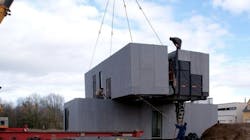Offsite construction: Why it’s important for the survival of your firm
After you read our new research report on the future of offsite construction (“New Day, New Mindset: Rethinking Offsite Construction”) published in partnership with the Construction Users Roundtable and the Construction Industry Institute, you may take away some powerful themes that jumped into my consciousness.
While reading the report findings, I was reminded of a friend of mine who recently had a heart attack. He told me, “It came out of left field. It hit me like a ton of bricks. I couldn’t believe that this was happening to me.” I asked him if his family doctor had said anything to him during his last checkup. “No, he completely missed it. He just said the same thing he’s been saying to me for the last 10 years: eat better, exercise more, and lose 30 lbs.”
My oblivious friend is a lot like where much of the industry finds itself today when looking at offsite construction. We’ve been talking about it for decades. Experts have been telling us to do something about it, or one day it will become a serious threat to the survival of our firms. We know we should do something, but we don’t really know where to start.
‘The industry is approaching its “heart attack moment,” with so many large projects that are chronically late, over budget, and unprofitable that it’s becoming an industry norm.’
Lack of technical knowledge, resistance to change, and the inability to develop strategic plans were the top reasons given for the aversion to adopt offsite construction. Some companies have gone through the motions, but many have ultimately reverted to their conventional field-build methods.
The trouble is that today the industry is approaching its “heart attack moment,” with so many large projects that are chronically late, over budget, and unprofitable that it’s becoming an industry norm.
Even though the survey found that nearly two-thirds of industry leaders recognized that offsite construction will fundamentally transform the industry in the immediate future, just as many (62%) are “on the fence” and are struggling to embrace offsite construction operationally and culturally in their organizations. Like attempting to get healthy through diet and exercise, everyone knows what he or she should do, but implementing lasting change is incredibly hard.
The survey found that companies that have successfully embraced offsite construction have done so by setting objective goals, yet only 16% of responders indicated they had a stated offsite construction goal. Staying the course of implementing such a fundamental operational and cultural change requires patience, as the initial benefits can seem minuscule relative to the disruptions and setbacks that may occur along the way.
The survey also found that companies that have successfully embraced offsite construction have done so by engaging outside expertise in managing the process and changing the culture. Getting people to embrace new ways of thinking and doing work differently is one of the most challenging aspects of organizational change.
Like my friend who suffered the heart attack, the status quo is no longer an option. The construction industry’s eventual transformation will occur in two ways. Companies that purposefully embrace offsite construction in goals, strategy, and culture will survive and thrive. Alternatively, companies that cling to past practices based on nostalgia for conventional practices will wither and fade away.
